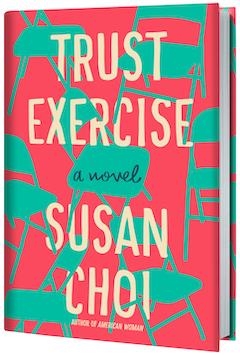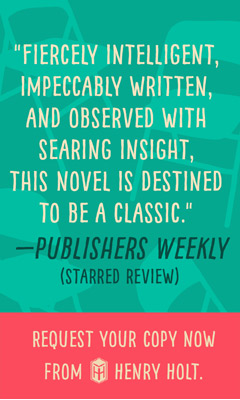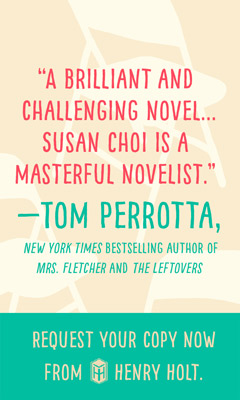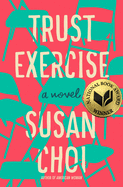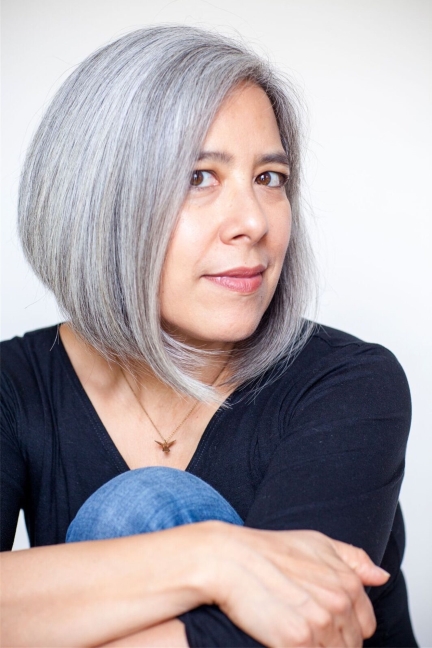Trust Exercise
by Susan Choi
In this truly innovative novel, Pulitzer finalist Susan Choi challenges her characters--and the reader--with an elaborate trust exercise set at prestigious high school Citywide Academy for the Performing Arts (CAPA). CAPA teens compete for roles both onstage and off against the backdrop of 1980s Anytown, America. They envy their peers and idolize their drama teacher as they experience the life-shaping trials and tribulations of young adulthood.
Sarah and David are from different sides of the tracks. David's family is financially well off; they live in a gracious neighborhood of "chunky brick mansions" and have a coveted membership to the Jewish Community Center. David even has his own car. Sarah, on the other hand, lives with her mom in a "chintzy, labyrinthine apartment complex of many hundreds of two-story brick boxes, strewn about scores of algae-stained in-ground swimming pools." She's reduced to bumming rides from Joelle, a girl she pretends to like for the social benefits, while she works part-time at a bakery to save money for a car of her own.
Despite their differing socio-economic status, the teens find themselves caught up in a passionate love affair and, eventually, a bitter breakup. Thanks to Choi's expert rendering of the volatile power of first love, the audience can't help but recall the intensity of the emotions, the blindfolded, exhilarating ride of a wildly pulsing heart: "Remember the impossible eventfulness of time, transformation and emotion packed like gunpowder into the barrel. Remember the dilation and diffusion, the years within days. Theirs were endless; lives flowered and died before waking and noon." Of course, youth is heady in the moment, but perspective comes with age--a fact some CAPA kids will learn all too late.
The reader isn't the only observer of this intense connection between the pair. Joelle sees what's going on, but her thoughts and feelings are inconsequential to Sarah--a negligence that will go unconfronted until the girls grow into women. Other peers and, more importantly, their drama teacher, Mr. Kingsley, notice as well. Mr. Kingsley uses his students' vulnerability to his advantage. The charismatic, larger-than-life mentor everyone wants to please manipulates the young lovers for a theatrical activity he calls "Ego Deconstruction." Sarah plays into this heartless game because Mr. Kingsley does matter to her.
The drama of Sarah and David, as well as their classmates, comes to life on the stage of adolescence, directed by their idol. And for one act, Sarah lands the plum role--Kingsley's chosen one: "Her fellow students are loitering in the hallway outside in the hopes of obtaining what she's just received: his particular summons. Pride and humiliation strangely mingle their tastes in her mouth.... Pride she's been chosen, humiliation at what she presumes are the grounds for his choice. They all know the students with whom he is sometimes seen driving away, at lunchtime, in his olive Mercedes; whom he detains with no more than a look, as the rest of the class filters out of the room; behind whom he closes the door to his office at lunchtime. They're the Troubled students, the borderline ones, whose sufferings are eagerly whispered the lengths of the halls."
But Sarah's rise to stardom is short-lived, and the arrival of a contingent of British students and their teacher sends the kids of CAPA into a fresh drama, complete with new players, new lines and new costumes. The kids form capricious relationships, and Choi expertly probes the elicited emotions. She scrutinizes the influencing factors and their reverberations over the years to come.
She questions memory and consent, taking the powerful to task, giving voice to the forgotten and challenging preconceptions. And the reader is led along the propulsive narrative path, up the highest of highs and down the lowest of lows, then thrown off course when Choi twists Trust Exercise in unexpected, winding ways. Her inclusive approach to the stories of all the teens--rich, poor, stars and nobodies--traces their trajectories well into the future. And it's that vast scope that forces the audience to question everything they think they know about memory and how it's stored. "How many rooms house the past?" she challenges the observer to consider. "Even poor people's houses were flabby with space; they were just cheaply made."
Including a complex examination of reality versus fantasy, Choi encourages the reader to lay private memories next to the events of Trust Exercise, in order to compare the revelations of the plot with his or her own hard-earned insights into life. This trust exercise of Choi's construction will most likely challenge readers' relationships with their own histories. What will they see as a result? Probably not what they expected. --Jen Forbus



